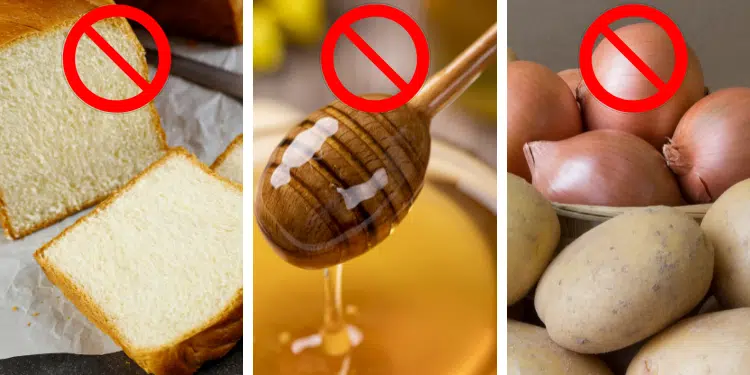Refrigeration is often seen as the best way to preserve food, but not all foods thrive in the cold.
In fact, keeping certain foods in the fridge can cause them to spoil faster, lose flavor, or even become harmful to consume.
Doctors and food safety experts agree that these 10 foods should never be stored in the refrigerator – and here’s why.
1. Potatoes
Refrigerating potatoes can alter their flavor and texture. The cold temperature causes the starch in potatoes to turn into sugar more quickly, resulting in:
- A gritty texture when cooked.
- A sweeter, less appealing taste.
- Potentially harmful levels of acrylamide when fried or baked at high temperatures.
Proper Storage:
Store potatoes in a cool, dark, and dry place, such as a pantry or cellar, to maintain their quality.
2. Tomatoes
Tomatoes lose their flavor and texture in the fridge. Cold temperatures disrupt the ripening process, which is essential for their taste. Additionally:
- The cold environment makes tomatoes mealy and less juicy.
- Refrigeration halts their natural development of sugars and acids.
Proper Storage:
Keep tomatoes on the countertop, away from direct sunlight, to allow them to ripen naturally.
3. Onions
Onions can become soft and moldy in the fridge due to the humid environment. Moreover:
- They may absorb moisture, which affects their texture.
- Refrigeration causes their aroma to spread to other foods.
Proper Storage:
Store onions in a well-ventilated area at room temperature. Keep them separate from potatoes to avoid accelerated spoilage.
4. Garlic
Refrigerating garlic affects its flavor and promotes sprouting. The cold environment can:
- Cause the garlic bulbs to become rubbery.
- Encourage mold growth.
- Diminish its potency and health benefits.
Proper Storage:
Keep garlic in a dry, cool place with good ventilation, such as a wire basket.
5. Avocados
Avocados do not ripen properly in the fridge. Cold temperatures slow down the ripening process, leading to:
- Uneven ripening.
- Loss of creamy texture and rich flavor.
Proper Storage:
Store unripe avocados on the countertop. Once ripe, you can refrigerate them for 1-2 days to extend their shelf life.
6. Bananas
Refrigerating bananas can cause the skin to darken prematurely. While the fruit inside may remain edible, refrigeration:
- Slows down the ripening process, affecting flavor development.
- Damages the banana’s cell structure, resulting in a mushy texture.
Proper Storage:
Keep bananas at room temperature. To slow ripening, separate them from other fruits.
7. Honey
Honey is a natural preservative and does not require refrigeration. Storing it in the fridge can:
- Cause crystallization, making it thick and hard to use.
- Alter its smooth texture.
Proper Storage:
Store honey in a tightly sealed container at room temperature, away from direct sunlight.
8. Bread
While refrigeration can prevent mold growth, it also makes bread dry and stale. The cold environment:
- Speeds up the staling process due to moisture loss.
- Compromises the bread’s texture and flavor.
Proper Storage:
Store bread in a breadbox or a cool, dry place. Freeze extra loaves if you need to store them long-term.
9. Coffee
Coffee beans and grounds absorb moisture and odors in the fridge, which affects their flavor. Refrigeration:
- Causes condensation, leading to a stale taste.
- Diminishes the coffee’s aroma and richness.
Proper Storage:
Keep coffee in an airtight container at room temperature, away from heat and light.
10. Oils (e.g., Olive Oil)
Storing oils in the fridge causes them to solidify and lose their smooth consistency. Refrigeration can:
- Make oils cloudy and hard to pour.
- Alter their flavor and usability.
Proper Storage:
Store oils in a cool, dark cupboard to maintain their quality and flavor.
Not all foods benefit from refrigeration, and improper storage can lead to waste or compromised quality.
By understanding which foods thrive outside the fridge, you can maximize their shelf life, flavor, and nutritional value. Keep this list handy to ensure your kitchen stays efficient and your food stays fresh!

